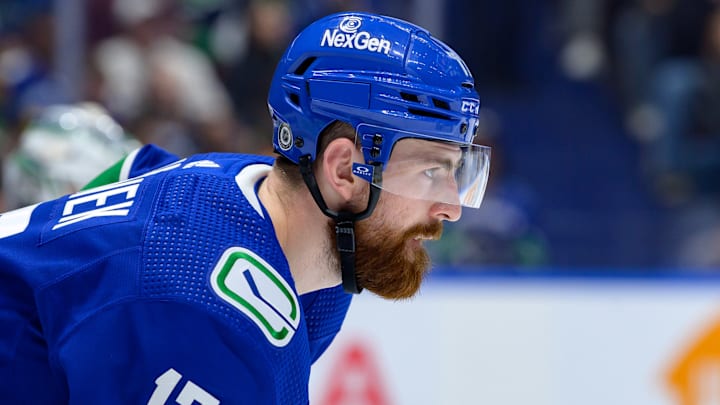On the face of it, Filip Hronek's eight-year, $58 million contract is good news for the Vancouver Canucks. They tie up one of their best blue-liners over the long term, as the team looks for more stability in the efforts to build on their excellent defensive play during the 2023-24 campaign.
Certainly, general manager Patrik Allvin is delighted with getting Hornek re-signed to his new multi-year deal. As per Sportsnet's Iain MacIntyre, Allvin said: "Although we had his rights for another year, I think this was important for our team knowing his contract number leading forward. And also, a younger defenceman on the right side that we feel that we can continue to work with. I think there is more to come there. We were extremely pleased to get it over the finish line here."
At the same time however, the size of the deal highlights the less positive side of having a salary cap in professional sports. For everyone that argues it helps in respect of parity and a more level playing field (hockey rink), there as just as many people who still believe it is unfair.
The reality is that the Canucks overpaid to retain Hronek, with his new deal carrying an annual cap hit of $7.25 million. And yet they still did 'better' than anticipated, with AFP Analytics projecting he would get around $7.5 million per season and speculation indicating he wanted as much as $8 million.
The knock-on effect of Hronek's deal
Unfortunately for fans, as much as the team wanted/needed the gruff defenceman back, his new deal has negative connotations when it comes to the Canucks' remaining pending free agents. The includes the reality that Nikita Zadorov and Elias Lindholm will likely not return to Vancouver for next season.
Zadorov is reportedly asking for anywhere between $5 million and $6 million per season over five years. Meanwhile, Lindholm is apparently looking at somewhere between $7 million and $8 million annually, on a similarly long-term deal.
Of course both players are entitled to ask for and try to get as much as possible, especially as pending unrestricted free agents. However, as with the deal Hronek has actually agreed, it's just too much money.
When is a lot of money not actually a lot of money?
What's crazy about this is that prior to Hronek's deal, the Canucks were in the eighth-best position among all NHL teams, with a projected cap space of $24,078,333 for next season. In fact it was theoretically as much as $26,578.33, when taking into account the likelihood that the final year of Tucker Poolman's contract of $2.5 million will be attributed to Long-Term Injured Reserve.
Despite all this though, the Canucks were still in a tough spot thanks to having nine pending unrestricted free agents, as well as Hronek and Arturs Silovs as restricted free agents. And with all of them wanting more money on their next deals, the realities of the negative side of the salary cap were there for all to see.
Now, with Hronek signed and sealed, as per Cap Friendly this leaves just $16,828,333 of projected cap space. Even with Poolman's money factored in, we live in a world where $19,328,333 will not be close to enough for the Canucks to re-sign all 10 of their remaining pending free agents.
Allvin has expressed his commitment and desire to continue improving the roster and making sure that this season's success is not a one-off. However, in paying Hronek so much, this may actually have the reverse effect and see the Canucks entering next season with a weaker overall team.
